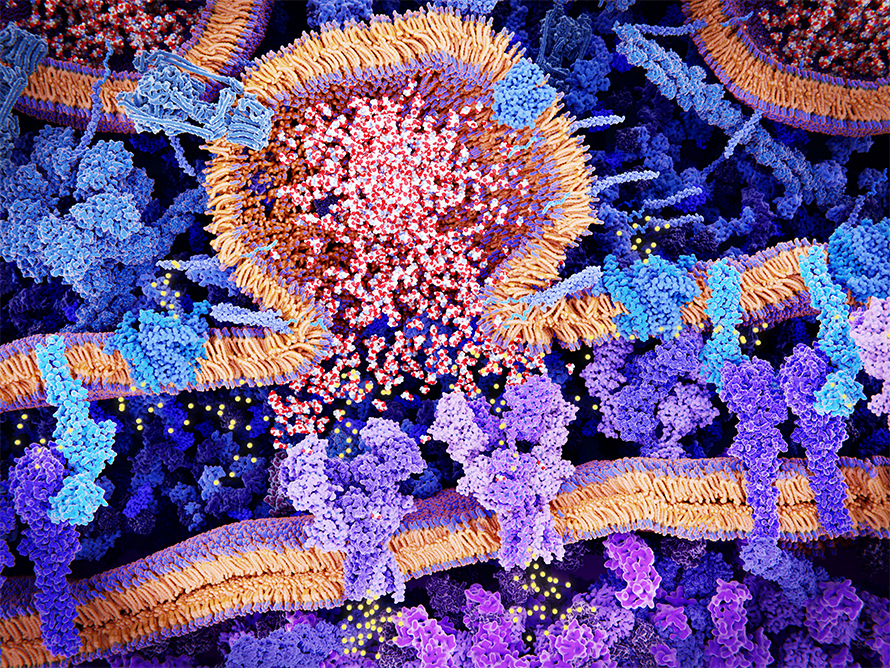Richard Silverman to speak at ASBMB 2025
Richard B. Silverman, a distinguished chemist and the Patrick G. Ryan/Aon Professor at Northwestern University, will be a featured speaker at the 2025 ASBMB Annual Meeting, presenting his research in enzyme inhibition and drug discovery. Best known for inventing pregabalin, or Lyrica, Silverman has dedicated his research to designing small molecules to treat central nervous system, or CNS, disorders, including epilepsy, amyotrophic lateral sclerosis, or ALS, Alzheimer’s disease and Parkinson’s disease as well as cancer.

At ASBMB 2025, he will discuss his new work on the mechanistic drug design of small molecules to treat epilepsy, neuropathic pain and hepatocellular carcinoma.
Silverman earned his Ph.D. from Harvard University in 1974 after a two-year interruption to serve in the U.S. Army during the Vietnam War at the Walter Reed Army Institute of Research, for which he received a Commendation Medal for Meritorious Service. Following his doctoral studies, he conducted postdoctoral research at Brandeis University under Robert H. Abeles, focusing on enzyme inactivation.
In 1976, Silverman joined Northwestern University, where he was a professor of chemistry, molecular biosciences and pharmacology. His research centers on designing and developing enzyme inhibitors for CNS disorders and cancer to develop new therapeutics.
His most notable discovery, pregabalin, or Lyrica, is widely used to treat fibromyalgia, neuropathic pain, seizures and anxiety. Pregabalin works by targeting a calcium channel receptor within the CNS and decreasing neuronal excitability. Silverman donated a part of the royalties from Lyrica to Northwestern University to support and promote collaborative and interdisciplinary research in molecular diagnostics and therapeutics.
With more than 400 research publications, nearly 150 patents and multiple international awards, Silverman’s contributions to organic chemistry and drug design have been recognized worldwide. His books on enzyme mechanisms and drug design are widely used in academia and industry.
Silverman has been elected to the National Academy of Sciences, the American Academy of Arts and Sciences, the National Academy of Inventors, the Medicinal Chemistry Hall of Fame and the Royal Society of Chemistry and has won many awards including, the Perkin Medal, the Arthur C. Cope Senior Scholar Award, the Tetrahedron Prize for Creativity in Bioorganic & Medicinal Chemistry, the Centenary Prize and the Abeles and Jencks Award for Chemistry of Biological Processes. He is a fellow of the American Chemical Society and the American Association for the Advancement of Science.
At ASBMB 2025, Silverman will present his latest research on the rational design and mechanisms of small molecules that target two enzymes: gamma-aminobutyric acid aminotransferase, as a treatment for epilepsy and neuropathic pain, and ornithine aminotransferase to treat hepatocellular carcinoma.

Enjoy reading ASBMB Today?
Become a member to receive the print edition four times a year and the digital edition monthly.
Learn moreFeatured jobs
from the ASBMB career center
Get the latest from ASBMB Today
Enter your email address, and we’ll send you a weekly email with recent articles, interviews and more.
Latest in People
People highlights or most popular articles

Sketching, scribbling and scicomm
Graduate student Ari Paiz describes how her love of science and art blend to make her an effective science communicator.

Embrace your neurodivergence and flourish in college
This guide offers practical advice on setting yourself up for success — learn how to leverage campus resources, work with professors and embrace your strengths.

Survival tools for a neurodivergent brain in academia
Working in academia is hard, and being neurodivergent makes it harder. Here are a few tools that may help, from a Ph.D. student with ADHD.

Quieting the static: Building inclusive STEM classrooms
Christin Monroe, an assistant professor of chemistry at Landmark College, offers practical tips to help educators make their classrooms more accessible to neurodivergent scientists.

Hidden strengths of an autistic scientist
Navigating the world of scientific research as an autistic scientist comes with unique challenges —microaggressions, communication hurdles and the constant pressure to conform to social norms, postbaccalaureate student Taylor Stolberg writes.

Women’s History Month: Educating and inspiring generations
Through early classroom experiences, undergraduate education and advanced research training, women leaders are shaping a more inclusive and supportive scientific community.

